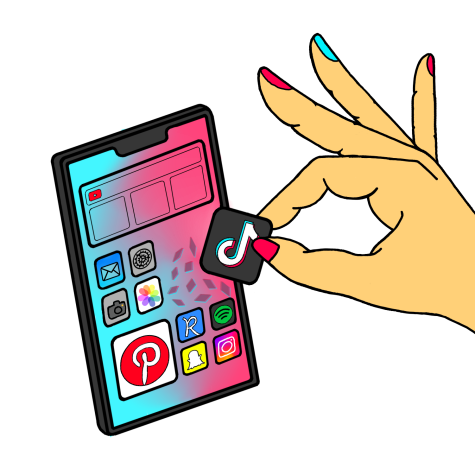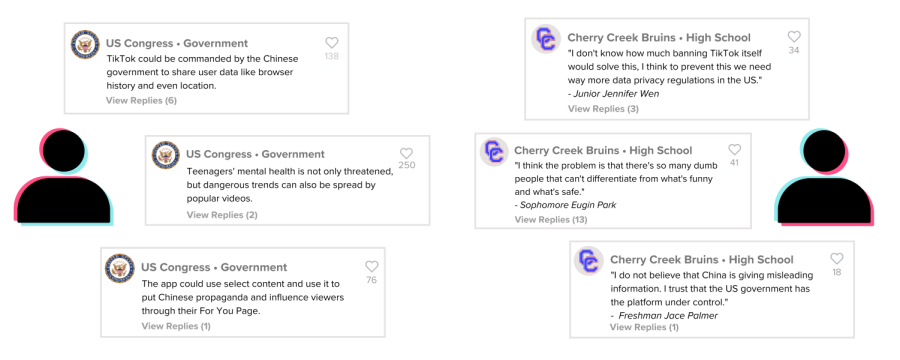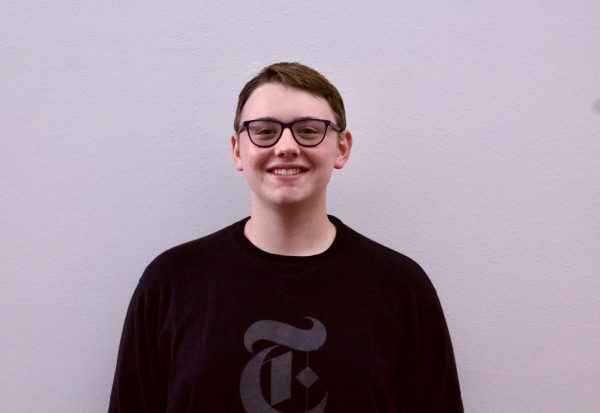Creek Responds to Potential TikTok Ban
Students of Creek respond to claims made in TikTok’s congressional hearing. Members of US Congress were suspicious of the social media app because of security and mental health risks.
May 10, 2023
Below a lighthearted surface of baking, dancing, and gaming, the US government believes that TikTok has a dark secret of data mining and sharing.
TikTok has shot up in popularity, with billions of global downloads. But recently TikTok CEO Shou Zi Chew testified before Congress where he had to respond to accusations relating to mental health, data security, and government influence.
The main concern that many members of Congress expressed throughout the March 23 hearing was data mining: that TikTok was being used by the Chinese government to access user data such as location and browser history.
This sudden panic is a result of a law passed in China compelling all Chinese companies to cooperate with the government in cases involving national security. US Congress worries that the rule might force TikTok to share user data like browser histories and IP addresses.
According to the Chinese law, TikTok would be heavily fined if they didn’t comply, but Chew says that TikTok hasn’t been ordered to share data. Congress asked Chew if any content on TikTok was influenced by the Chinese government. He claimed that “TikTok will remain a place for free expression and will not be manipulated.”
Another major threat that social studies teacher Tom Michel is afraid of is passwords and user information. “I did a seminar with my class…many of them have the same password for TikTok that they have for other apps,” Michel said. “One even admitted to me that their banking password and user ID was identical to the one that they use for TikTok.”
When students use identical passwords for other sites, it could become a threat to alternative accounts, not just TikTok.
But despite the government involvement with the social media app, many don’t agree with the congressional claims. “I don’t think all the accusations are true, but anything is possible,” freshman Jace Palmer said.
Palmer is not only a viewer of TikTok, but a creator as well. He runs a gaming and VR channel, @good_nme, and he has considered switching platforms to YouTube or Twitch, even though they are “both more difficult to manage a steady view basis.”
For other students, the controversy surrounding the app seems to echo a sentiment reminiscent of the fear that sparked anti-Asian hate in the early days of the COVID pandemic.
“While banning TikTok may seem like a measure for helping with national security…I don’t want to see another spike in Asian-American hate,” junior Jennifer Wen, a Chinese American, said.
Wen believes that when the government goes after a Chinese company, the public’s perspective is different than an attack on American social media. “Banning Facebook would be seen as infringing on freedom of speech or expression,” Wen said, “while banning TikTok may seem like a measure for helping with national security.”
More recently, rising tensions between the United States and China have resulted in an intensifying political rhetoric against the Chinese government.
Asian civil rights leader Zhengyu Huang worries that the language politicians use against the Chinese government may also be directed at the Chinese people or even Asians in general.
“We are afraid that, more and more, the actions and the language of the government is premised on the assumption that just because we are Chinese or have cultural ties to China that we could be disloyal, or be spies, or be under the influence of a foreign government,” Huang said in an interview with CNN.
Apart from national security, lawmakers at the hearing questioned whether or not TikTok is a threat to its user’s mental health, particularly considering the app’s popularity and influence among teenagers.
Addiction to social media and children’s exposure to inappropriate or dangerous content were some of the biggest concerns at the hearing. Committee members argued that TikTok has a dark history of passively allowing users to promote dangerous behavior through popular trends with little regulation from the app itself.
Though she has many of the same concerns, social worker Dr. Alexis Toussaint doesn’t believe a ban would be an effective means of minimizing the harm of social media. From her perspective, TikTok is ultimately replaceable. Teenagers can already consume similar content on YouTube Shorts or Instagram Reels, the only thing that will make a real difference in teens’ mental health, according to Toussaint, is their choices on what kind of content they consume.
“It’s personal decisions that are making social media so bad,” Toussaint said. “The things that you are constantly feeding yourself are the things that social media is going to constantly push towards you.”
According to school psychologist Meli Holohan, conversations over banning the app are less productive than encouraging self-control and critical thinking – especially when it comes to trends. She cited Devious Licks, a viral 2021 TikTok challenge, as an example of a trend where teenagers across the country have had to face repercussions for stealing or vandalizing.
“Just because someone posted a cool video about it on TikTok and kids all over the country might be doing this, they’re not showing you the disciplinary meetings, they’re not showing you the test they couldn’t take because they were suspended, they’re not showing you that they were up for expulsion,” Holohan said. “Being able to think beyond the video…to the potential outcomes, that’s a skill I’d rather focus on.”























